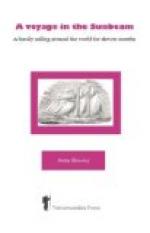We drove along under avenues of now leafless trees to the foot of the hill on which the Pyramids are situated. Here everybody was turned out to walk except Muriel and me, and a tremendous tug the horses had to drag even us two up to the real foot of the Pyramids. On arriving we were at once surrounded by a crowd of Arabs. They are certainly a fine-looking lot of men, rather clamorous for backshish, and anxious to sell their curiosities, real or imitation. They were, however, good-natured, civil, and obliging, and amused me much during the hour I spent alone with them while the rest of the party were ascending and descending the Pyramids. Many could speak several languages quite fluently, and almost all of them took a good deal of interest in the war, and the prospects of success on either side; while many had a fair knowledge of the geography of Europe. While all the rest were on the top of the one large Pyramid, a man ran down from the summit and up to the top of the next smaller one (which is, however, more difficult to ascend) in ‘eight minutes for a franc’ This feat was repeated several times by different men, but it really occupied nearer ten minutes.
We ate some bread and wine, bought a few curiosities, and then drove back to the city, feeling very cold and shivery and regretting the wraps we had left behind. We reached the hotel just in time for twelve o’clock table-d’hote breakfast, and, after an acceptable rest, sallied forth again, this time on donkeys, to see the bazaars and the sunset from the citadel. We went across squares and gardens and through wide streets, for, alas! Cairo is being rapidly Haussmannised. For the capitalist or resident, Cairo may be improved, but for the traveller, the artist, the lover of the picturesque, the quaint, and the beautiful, the place is ruined. Cairo as a beautiful and ancient oriental city has ceased to exist, and is being rapidly transformed into a bad imitation of modern Paris, only with bluer skies, a more brilliant sun, and a more serene climate than it is possible to find in Europe. Only a few narrow streets and old houses are still left, with carved wooden lattices, where you can yet dream that the ’Arabian Nights’ are true.
We went to the gold and silver bazaar, and bought some quaint silver jewellery from Assouan, Soudan, and Abyssinia; then through the Turkish bazaar, the saddlery bazaars, past mosques and old houses, till at length we emerged into new squares and new streets, before climbing the hill to the citadel, the Viceroy’s palace, and the splendid Mosque of Mehemet Ali, built of Egyptian alabaster. The view from the terrace is superb, over city, desert, river, palm-trees, and Pyramids. The sunset this evening was a disappointment; yellow, cold, and watery, a strong north wind bringing up all the sand from the desert. We returned to the hotel for dinner, and were all glad to go early to bed.
Sunday, April 29th.—The children and I went to the English church, a semi-Gothic building, without a single window which could open. Though the church was nearly empty, the air felt like that of an exhausted receiver, and made one gasp. In the cool of the afternoon we drove through Roulai, where the museum stands, in a beautiful garden close by the riverside, amid flowers in full bloom.




